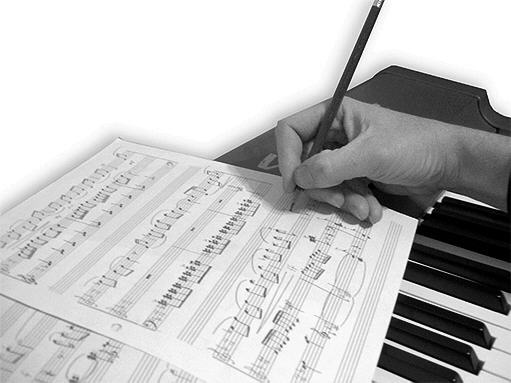
Ten Tips on Writing Music
-
Write the Lyrics for Your Song

Many musicians write their own melodies as well as the lyrics. If you already have lyrics, consider them when writing your melody. Some questions to ask yourself before composing the music are: What words do I want to focus on? Are there note lengths or timing that will accommodate certain words better than others will?Consider the following line: I DROVE my CAR down the HIGHWAY. The emphasized words DROVE, CAR and HIGHWAY give the listener an idea of what is going on, even if these are the only words they hear. On the other hand, if you sing the same line but emphasize different words: I drove MY car DOWN THE highway. The listener might have no idea what you're singing about.
You can emphasize words with a louder note, changing the note itself, a longer note or including a rest before or after the note. Experiment with your song and see what sounds the best.
-
Listen to and Learn from Other Composers
There is something to be learned from every single musician or band out there. Listen to how your favorite musicians construct their songs-examine the style, the tone, how different instruments work together and so on and so forth. You can implement many of the same ideas into your own music or even take some of their riffs and tweak them to fit your style. This is a great way to come up with new melodies. -
Use Music Composition Software
Music composition software can be a musician's best friend. These programs aid in the writing process by organizing your work and allow you to see what you're playing. Quality software packages provide features including a metronome to keep beat, playback, so you can listen to what you've composed, input, so you can hook your instrument or microphone directly to your computer and notate a song you play or sing and tons of editing tools so you can easily compose a riff. -
Look for Musical Inspiration
Before writing a piece of music, it's critical to feed your mind inspiration. Inspiration comes from all around us: our emotions, relationships, nature, people and experiences-some songs are even about surreal situations. A big part of finding inspiration is putting yourself in situations that rouse inspiration and then recognize it when it comes.We all have different people come into our lives; relationships have always been hot topic for songwriters. To generate other ideas get out of the house, go somewhere, and do something. This could even be something as simple as walking in the park or down the street. You'll be amazed where inspiration can be found.
-
Have Fun
You first started writing music because you love music. If you're not enjoying composing music, then do something else for a while. People tend to do what they love best. -
There is No Wrong Answer in Music Composition
Writing music is one of those things you can do and never make a mistake. Some melodies are catchier than others are, and everyone will write some bad stanzas. It's all right; that's why we have revisions. Remember this while writing music: it will make you feel better and help you avoid writer's block. - Define Your Music Composition Goal
Are you writing music for yourself or for other people? This alone will totally change the tone and style of your music. If you are writing for yourself, you have more freedom to write what and how you want.In contrast, if you are writing for other people, it is a good idea to identify your target audience and write music they will enjoy.
-
Seek Advice and Opinions
People are always willing to give advice and opinions; take their comments into consideration when writing music. Give your music to family members and friends to get their opinion of your songs. Though people close to you may be biased, their comments are still valuable. -
Do Something Different
It's easy to get stuck in a rut and all of your songs begin to sound the same. Even if you've found a great combination of notes or a catchy beat, changing it can be good and help you grow as a composer.An easy way to try something new is pick up an instrument you haven't played before. Sometimes you find yourself playing the same old keys or strumming the same chords on your guitar. A different instrument can lead you to melodies you may not have thought of otherwise.
-
Practice, Practice and More Practice
There is no substitute for hard work and practice-it is the only formula that will guarantee you will become a better songwriter.
(Courtesy of Top Ten Reviews)













